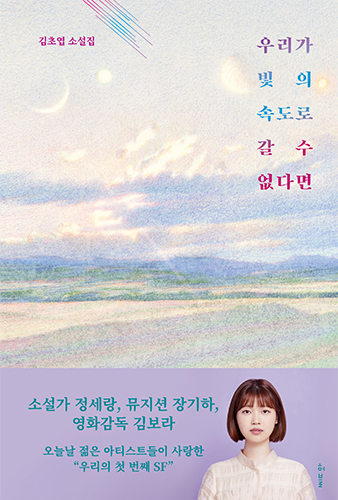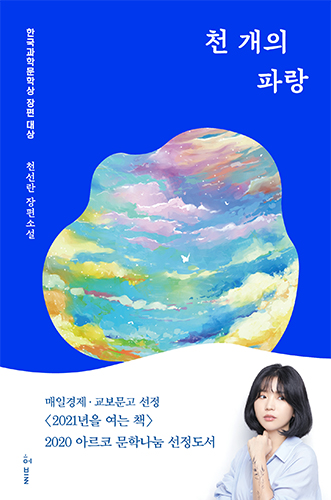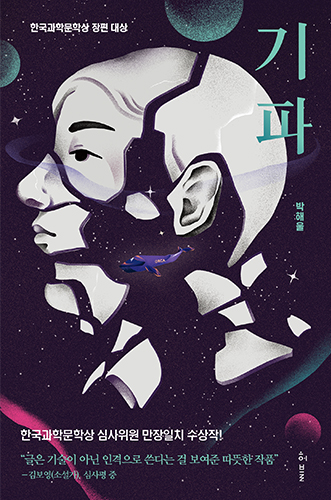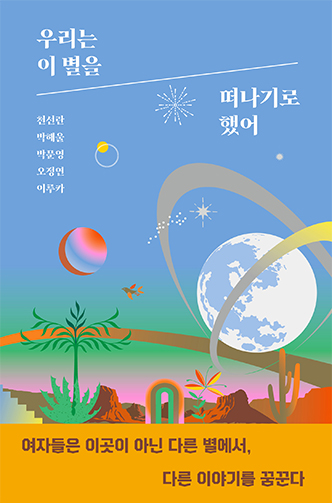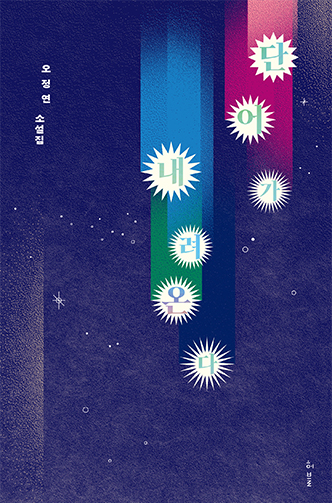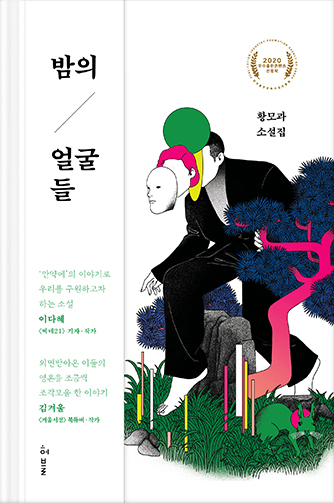|
Korean Publishers
Hubble The Happy Imagination of Tomorrow
2021.08.02
We are living in an era where Sci-Fi has become mainstream. The genre grew exponentially in Korea compared to 5 years ago, and the readership has become younger. Hubble, the Sci-Fi brand of publisher East Asia Books, stands as a leading publisher in Sci-Fi literature in Korea, hosting and organizing the Korean Science Literature Award. Following is an interview with publisher Hubble, which creates Korean-style Sci-Fi books that add stories of the marginalized such as the socially weak and minorities, to traditional Sci-Fi and interprets them from various perspectives.
Logo of publisher Hubble
Please introduce yourself to overseas publishers.
Hi, I’m Kim Hak-Je, the lead editor at Hubble. We borrowed the name “Hubble” from the Hubble Space Telescope. Just like how the telescope observes “stars’ past” 100 million light-years away, publisher Hubble aims to become a telescope that observes the “future of Korean Sci-Fi” and the “universe between the readers and us.” Hubble was founded in 2016 along with the establishing of the first Korean Science Literature Award, the one and only literary award for amateur Sci-Fi writers in Korea. Our representative titles are If We Cannot Move at the Speed of Light and A Thousand Blues. which were loved by 200 thousand and 50 thousand readers, respectively. Both are the debut works of writer Kim Cho-Yeop and Chun Sun-Ran at the Korean Science Literature Award. Along with such success cases, the award is increasing the scale of prizes in line with its growing reputation. In addition, Studiodragon, one of the greatest drama production companies, will be joining them from this year.
What is the screening standard of the Korean Science Literature Award hosted by Hubble?
The award gives full responsibility to the juries. Hence, we only have an indirect influence on how the juries are selected. We don’t have a particular criterion or standard for choosing the juries – we tend to invite writers and critics recognized in the Sci-Fi world. Yet, as we will be hosting the award with Studiodragon from this year and on, we are thinking of recruiting people prominent in the film and drama industries. Studiodragon also does not interfere with the screening.
What is the export status of Hubble’s works?
The publication rights of writer Kim Cho-Yeop’s If We Cannot Move at the Speed of Light were exported to Japan, China, Taiwan, and Spain, while those of Chun Sun-Ran’s A Thousand Blues were exported to Japan and Germany. The one that was actually translated and published was If We Cannot Move at the Speed of Light, with the Japanese title わたしたちが光の速さで進めないなら. And Hubble also recently participated in the Online Publishers Roundtable hosted by the Literature Translation Institute of Korea. In the course of exchanging thoughts with literary people from around the world, we could see that many of them were highly interested in Korean Sci-Fi and especially Hubble, the publisher at its center. We expect Hubble to export more works, including the aforementioned two titles taking this opportunity.
Publisher Hubble aims to become the telescope
What is the reason Hubble chose to specialize in Sci-Fi among all other genres?
Publisher East Asia is renowned for transforming science as a genre into liberal arts. As it was the first publisher to realize that the generational discourse is eyeing scientific thinking, it could see that literary discourse was also heading towards science. And as publisher East Asia had a firm foundation of science writers and readership, it could launch a Sci-Fi brand relatively without difficulty.
What does publisher Hubble think is the appeal of Sci-Fi genre literature?
Let’s begin with how the Sci-Fi boom in Korea began in the first place. Sci-Fi in Korea has met a new readership. If it was mainly the 40s reading Sci-Fi works, it is the 20s and 30s, women, today. As the new readers came from the existing literary world, the “Sci-Fi boom” can be referred to as the “readers’ shift from traditional literature to Sci-Fi.” The female readers in their 20s and 30s have been yearning for language that represents the socially weak and minorities, including women. The literary world responded to their demand to a certain extent, but as they directly discuss the indifferent reality, they were not an adequate “tool for solidarity.” Meanwhile, Sci-Fi can indirectly touch upon such topics through the virtual world derived from the physical world. So, even though Sci-Fi books talk about the apathetic society just like traditional literature, they might sound softer, as they have a filter called the virtual world. We think that such softness of Sci-Fi books was found attractive by female readers in their 20s and 30s. In other words, we believe that the appeals of Sci-Fi today come from the genre’s nature which makes it adequate as a language of solidarity and sympathy against social discrimination and violence.
Is there a fun way readers can enjoy Hubble’s books?
Many readers pick the cover designs when they think of publisher Hubble. Before the rise of the Sci-Fi boom in 2019, Sci-Fi was regarded as a groundless and childish genre. Such stereotypes made it hard for us to interact with readers. No matter how good the work could be, it is useless if there are no readers. So, we first had to handle the stereotype surrounding “Sci-Fi fiction.” The solution we came up with was realizing the world view of Sci-Fi in the cover design. If traditional literature expresses a human’s inner self with writing style and sentences, Sci-Fi uses its scientific world view as the window. We believed that if we show the extraordinary worldview unique to Sci-Fi collaborating with famous illustrators, we might be able to at least clear the false understanding that the genre is just dreamy. And fortunately, the readers were positive about this strategy. Hubble will continue our efforts in cover designs. Even the tiny illustrative details on the cover are all related to the work. If you read the story and compare it with the cover design in between, you might be able to find more fun reading it.
Please recommend to us some of your popular books.
If We Cannot Move at the Speed of Light, A Thousand Blues, Gipa
Kim Cho-Yeop’s novel collection: If We Cannot Move at the Speed of Light
Chun Sun-Ran’s full-length novel: A Thousand Blues * K-Book Trends Vol. 30 – Interview of writer Chun Sun-Ran
Park Hae-Ul’s full-length novel: Gipa
Please introduce and recommend Hubble’s new titles.
We Have Decided to Leave This Planet, Word is Coming Down, Faces of the Night
Chun Sun-Ran and 4 others: We Have Decided to Leave This Planet
Oh Jeong-Yeon’s short story collection: Word is Coming Down
Hwang Mogua’s short story collection: Faces of the Night
We are planning to present works that break down the boundaries that we think are dividing realms.
What are your future plans?
As the answer to the question you asked earlier about the screening criteria, we said that Hubble hopes to become a language of sympathy and solidarity that goes beyond genres, generations, and national borders. So, as the plan for that, Hubble is preparing two new fiction series. One is a Korean fiction series titled “Chowal (meaning transcendence).” With the goal of surpassing the genre’s limitations, we are preparing to present Sci-Fi stories written by traditional literature writers or those of other genres who have never written a Sci-Fi story before. Another one is titled “Warp,” which is a foreign fiction series. Aiming to progress beyond the era’s limitations, the series will be showcasing Sci-Fi that suits the taste of current Korean readers, not that of the American readers from the past. We will first successfully launch the two series transcending the boundaries of genre and generation, and then prepare other series that even go beyond national borders.
Website hubble.page
Organized by Lee Ji-Hyeon
#Hubble#East Asia#Sci-Fi#Korean Science Literature Award#Science |
Pre Megazine
-

Yellowpig
VOL.70
2024.05 -

Writer Jung Yeong-Wook
VOL.70
2024.05 -

Jakkajungsin Publishing Co.
VOL.69
2024.04 -

Writer Yun Jung-Eun
VOL.69
2024.04 -

Jumping Books Publishing House
VOL.68
2024.03 -

Writer Kim Hwa-Jin
VOL.68
2024.03 -

Publisher Hyohyung
VOL.67
2024.02 -

Writer Minha
VOL.67
2024.02 -

Almond Publishing
VOL.66
2024.01 -

Writer Kwon Jung-Min
VOL.66
2024.01 -

Hakgojae Publishers
VOL.65
2023.12 -

Writer Kim Hye-Jung
VOL.65
2023.12 -

Eidos Publishing House
VOL.64
2023.11 -

Writer Hwang In-Chan
VOL.64
2023.11 -

Munhakdongne
VOL.63
2023.10 -

Writer Chang Kang-myoung
VOL.63
2023.10 -

Happywell Publishing
VOL.62
2023.09 -

Writer Baik Soulinne
VOL.62
2023.09 -

Dasan Contents Group (Dasan Books)
VOL.61
2023.08 -

Writer Lim Kyoung-Sun
VOL.61
2023.08 -

SpringSunshine Publishing Co.
VOL.60
2023.07 -

Writer Lee Kyung-Hye
VOL.60
2023.07 -

Human Cube
VOL.59
2023.06 -

Doctor Jeong Jae-Seung
VOL.59
2023.06 -

Anonbooks
VOL.58
2023.05 -

Writer Son Bo-Mi
VOL.58
2023.05 -

Namhaebomnal
VOL.57
2023.04 -

Writer Kim Bo-Young
VOL.57
2023.04 -

Hugo Publishing
VOL.56
2023.03 -

Writer Cho Kwang-Hee
VOL.56
2023.03 -

Balgeunmirae Publishing Co.
VOL.55
2023.02 -

Writer Lee Byung-Ryul
VOL.55
2023.02 -

Wisdom House, Inc
VOL.54
2023.01 -

Writer Jeong Jia
VOL.54
2023.01 -

Humanitas
VOL.53
2022.12 -

Writer Kim Yeon-Su
VOL.53
2022.12 -

Songsongbooks
VOL.52
2022.11 -

Writer Eun Hee-Kyung
VOL.52
2022.11 -

Bombom Publishing Co.
VOL.51
2022.10 -

Writer Jiwon Yu
VOL.51
2022.10 -

Hangilsa Publishing Co., Ltd.
VOL.50
2022.09 -

Writer Kim Won-Young
VOL.50
2022.09 -

Moksu Publishing Company
VOL.49
2022.08 -

Writer Yoo Sun-Kyong
VOL.49
2022.08 -

Next Wave
VOL.48
2022.07 -

Writer Park Sang-Young
VOL.48
2022.07 -

A Thousand Hopes
VOL.47
2022.06 -

Writer Bora Chung
VOL.47
2022.06 -

Woongjin ThinkBig
VOL.46
2022.05 -

Dr. Oh Eun-Young
VOL.46
2022.05 -

JECHEOLSO Publishing House
VOL.45
2022.04 -

Writer Jang Ryu-Jin
VOL.45
2022.04 -

Changbi Publishers
VOL.44
2022.03 -

Writer Kim Ho-Yeon
VOL.44
2022.03 -

Mati Books
VOL.43
2022.02 -

Writer Lee Kkoch-Nim
VOL.43
2022.02 -

Picturebook Gongjackso
VOL.42
2022.01 -

Writer Kim Sang-Wook
VOL.42
2022.01 -

Writer So-yeon Park
VOL.42
2022.01 -

Writer Yoo Eun sil
VOL.42
2022.01 -

Kungree Press
VOL.41
2021.12 -

Writer Kim Lily
VOL.41
2021.12 -

Writer Park Yeon-jun
VOL.41
2021.12 -

Writer Yi Hyeon
VOL.41
2021.12 -

A deeper world told through picture books 'Iyagikot Publishing (Story Flower)'
VOL.12
2019.06 -

Author Jeon Min-hee
VOL.12
2019.06 -

Illustrator Kim Hwan-Young
VOL.13
2019.07 -

Travelers sailing through the sea of knowledge - 'Across Publishing Group Inc.'
VOL.13
2019.07 -

Genre Novel Publisher 'Arzak Livres'
VOL.14
2019.08 -

Author Lee Yong-han
VOL.14
2019.08 -

Wookwan Sunim
VOL.15
2019.09 -

East-Asia Publishing
VOL.15
2019.09 -

Author Jo Jung-rae
VOL.16
2019.10 -

EunHaeng NaMu Publishing
VOL.16
2019.10 -

Writer Heo Kyo bum
VOL.40
2021.11 -

Writer Kim So-Young
VOL.40
2021.11 -

Author-illustrator Kim Sang Keun
VOL.40
2021.11 -

ACHIMDAL BOOKS
VOL.40
2021.11 -

Author Kang Gyeong-su
VOL.17
2019.11 -

Moonji Publishing Belongs to the Literary Community
VOL.17
2019.11 -

Author Kim Yun-jeong
VOL.18
2019.12 -

I-Seum
VOL.18
2019.12 -

Kim Cho-Yeop
VOL.19
2020.02 -

Creating a window into the future with books
VOL.19
2020.02 -

Author Serang Chung
VOL.20
2020.03 -

Hey Uhm
VOL.20
2020.03 -

Writer Lim Hong-Tek
VOL.21
2020.04 -

BIR
VOL.21
2020.04 -

Writer Song Mikyoung
VOL.39
2021.10 -

Author-illustrator Kim Dong Su
VOL.39
2021.10 -

Writer Lee Seula
VOL.39
2021.10 -

Tabi Books
VOL.39
2021.10 -

Writer Kim Soo-hyun
VOL.38
2021.09 -

Author-illustrator Lee Myoung Ae
VOL.38
2021.09 -

Writer Hwang Sunmi
VOL.38
2021.09 -

Kidari Publishing Co.
VOL.38
2021.09 -

Writer Sohn Won-Pyung
VOL.22
2020.05 -

Woods of Mind's Books
VOL.22
2020.05 -

Writer Heungeul
VOL.23
2020.06 -

Gloyeon
VOL.23
2020.06 -

Maumsanchaek
VOL.24
2020.07 -

Winners of the 2021 Bologna Ragazzi Award
VOL.37
2021.08 -

Picture book artist Lee Suzy
VOL.37
2021.08 -

Author-illustrator Yi Gee Eun
VOL.37
2021.08 -

Hubble
VOL.37
2021.08 -

Writer Baek Se-Hee
VOL.25
2020.08 -

Bearbooks Inc.
VOL.25
2020.08 -

Author Baek Hee-Na
VOL.26
2020.09 -

Yuksabipyoungsa
VOL.26
2020.09 -

Writer Kang Hwa-Gil
VOL.27
2020.10 -

Kinderland (Bandal)
VOL.27
2020.10 -

Writer Ha wann
VOL.36
2021.07 -

Author-illustrator Myung Soojung
VOL.36
2021.07 -

Writer Jung Yeo-Wool
VOL.36
2021.07 -

Publisher EcoLivres
VOL.36
2021.07 -

Writer Lee Geumi
VOL.28
2020.11 -

Sakyejul
VOL.28
2020.11 -

Writer Kim Keum-Hee
VOL.29
2020.12 -

Geulhangari
VOL.29
2020.12 -

Writer Cheon Seon-Ran
VOL.30
2021.01 -

Hyang Publishing House
VOL.30
2021.01 -

Writer Lee Hee-Young
VOL.31
2021.02 -

Sanzini
VOL.31
2021.02 -

Publisher Prunsoop
VOL.32
2021.03 -

Writer Sim Yun-Kyung
VOL.32
2021.03 -

Hanbit Media
VOL.35
2021.06 -

Hyeonamsa
VOL.33
2021.04 -

Author-illustrator Noh Inkyung
VOL.33
2021.04 -

Writer Cho Won-Jae
VOL.35
2021.06 -

Writer Kim Jung-Mi
VOL.34
2021.05 -

Safehouse Inc.
VOL.34
2021.05





